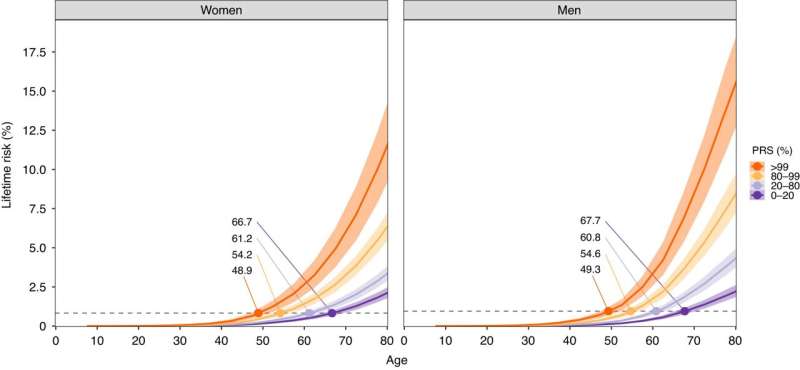This article has been reviewed according to Science X's editorial process and policies. Editors have highlighted the following attributes while ensuring the content's credibility:
fact-checked
peer-reviewed publication
trusted source
proofread
Genetic information can improve colorectal cancer screening, shows study

Colorectal cancer is one of the most common cancers in worldwide, with approximately 3,000 Finns diagnosed every year. Although hereditary predisposition is one of the most important risk factors for colorectal cancer, risk assessment for the disease currently only considers family history and certain individual genetic variants in selected patients.
In a study, published in the British Journal of Cancer, the researchers utilized genetic data and health records of more than 450,000 Finns available through the large FinnGen biobank study and the Finnish Cancer Registry.
For each participant, the researchers constructed a polygenic risk score for colorectal cancer, which describes the individual's overall genetic risk of developing the disease. Next, the performance of the polygenic risk score was evaluated to see if it could identify individuals who received a diagnosis of colorectal cancer during their lifetime.
The results showed that the polygenic risk score identified individuals at particularly high or low risk of developing the disease.
For example, up to 16% of men with the highest risk score were diagnosed with colorectal cancer by the age of 80, compared with around 4% in the average population and around 2% in those with the lowest risk score. People with the highest polygenic risk score were therefore almost four times more likely to develop colorectal cancer than the average population.
"Most people diagnosed with colorectal cancer have neither family history nor other known strong risk factors. Many of them have high polygenic risk for colorectal cancer, but these individuals are currently not identified in the health system," says Dr. Nina Mars at the University of Helsinki, the senior author of the study.
Screening of people at higher genetic risk of cancer should start earlier
Population screening for colorectal cancer was launched in Finland in 2022, initially for people aged 60–68 years and expanding to cover those aged 56–74 years in the coming years.
The study findings suggest that this type of non-selective screening could be improved by genetic risk information. Based on the researchers' estimates there could be a difference of up to 18 years between the lowest and highest risk groups in the age at which screening could be initiated based on their inherited risk alone.
"One promising use of the polygenic risk score for colorectal cancer would be to determine the optimal age to start screening based on personal inherited risk," says Max Tamlander, MD, Doctoral Researcher at the Institute for Molecular Medicine Finland (FIMM), University of Helsinki, the lead author of the study.
According to the researchers, the polygenic risk score could also be a useful tool for assessing the risk of colorectal cancer after a colonoscopy, the current gold-standard screening method, if no tumors had been discovered in the examination. This could help identify high-risk individuals who might benefit from earlier follow-up after colonoscopy.
"Finding solutions to improve early detection of colorectal cancer is important, as these cancers are increasing in frequency both in Finland and worldwide," Dr. Mars continues.
More information: Max Tamlander et al, Genome-wide polygenic risk scores for colorectal cancer have implications for risk-based screening, British Journal of Cancer (2024). DOI: 10.1038/s41416-023-02536-z


















